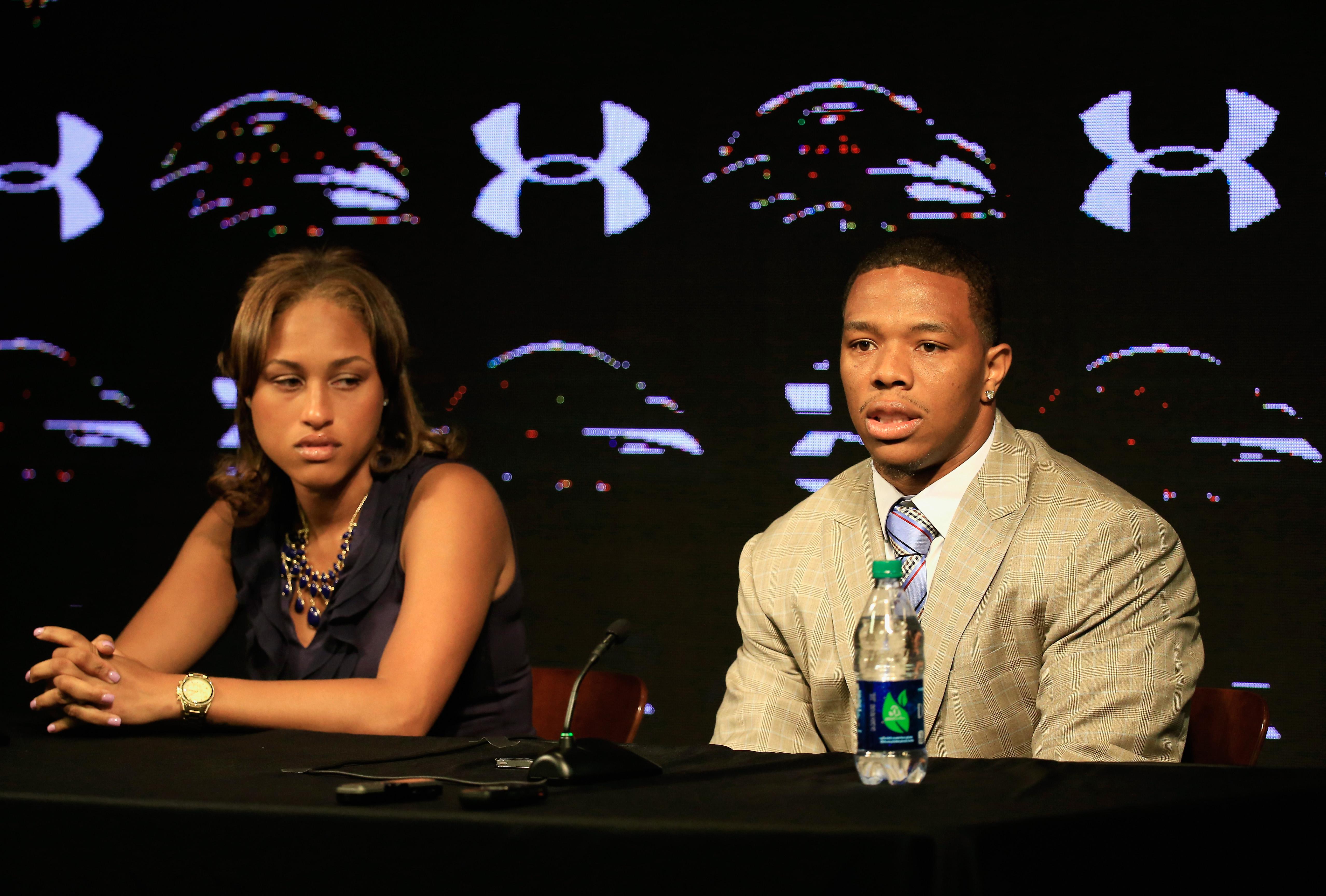Since the story of Ray Rice abusing his then-girlfriend, now-wife Janay Rice broke earlier this year, both the NFL and the Baltimore Ravens have used the fact that Janay forgives and defends her husband—and has even been willing to blame herself—as cover for their own willingness to punish him harshly. Ray and Janay Rice held a dual press conference at the Ravens training camp in July to send the message that they share the blame in the elevator incident (this was before we saw the video of what transpired in there). The Ravens Twitter account trumpeted back in May, “Janay Rice says she deeply regrets the role that she played the night of the incident.” (The tweet was deleted just this week.) And Mike Freeman of Bleacher Report reported that Rice was blaming his wife to his fellow players, quoting an anonymous Ravens player as saying that “Rice told teammates that he had no choice but to defend himself that day in the elevator.”
Ravens owner Steven Bisciotti basically admitted that he went easy on Ray Rice by foisting much of the blame on Janay Rice in an open letter to fans on Tuesday:
Assessing the situation at of the end of February, this is what we knew: A player who had been a model citizen in the community and terrific teammate for six seasons had been charged with simple assault against his fiancé. At that time, his fiancé Janay had been similarly charged.
Ray and Janay both told us nothing like this had happened before. He was showing great remorse; they were meeting regularly with our team chaplain and were diligently attending couples counseling.
Now that the video is out, Janay Rice continues to defend her husband, telling ESPN, “I love my husband. I support him. I want people to respect our privacy in this family matter.” But the release of a video showing exactly what happened in the elevator—Ray Rice knocking out Janay—and being forced to confront the vast gulf between her behavior and his has compelled both the Ravens and the NFL to stop hiding behind Janay Rice’s defense.
The release of the video may have changed everything, but no one should have had to see it to understand that Janay’s defense of her husband says little about his guilt or innocence. Setting aside the question of what the team and league management knew about the video and when, if they are going to investigate domestic violence claims about their players, they should know something about domestic violence. For instance, that victims frequently defend and stay with their abusers. That they do this because they are human and it’s very difficult to accept that someone you love has this capacity for cruelty. That an abuser often isolates his victim from friends and family, making her emotionally dependent on him. By the time a man is beating a woman, he has gained some assurance that she will not leave him for it.
As memoirist Leslie Morgan Steiner, a survivor of domestic violence and now an activist, wrote at CNN last year, domestic violence victims “want the abuse to end” but they “don’t want the relationship to end.” And this isn’t just because abused women love their abusers. In our society, where divorce is seen as a failure and working on your marriage is considered virtuous, it can be easy for victims to think that if they just stick with the marriage, and keep trying to improve it, the abuse will stop. That’s why hundreds of survivors flooded Twitter this week with the #WhyIStayed hashtag, explaining how easy it is to fall into the trap of defending the relationship instead of getting out. The Ravens themselves fell into the trap of thinking “couples counseling” was the answer, so it’s not remotely surprising that any individual who wants to believe in the man she loves would also hope for a fix.
The lack of basic knowledge about the psychology of domestic violence is particularly inexcusable in light of the 2012 murder of Kasandra Perkins at the hands of Kansas City Chiefs linebacker Jovan Belcher. Prior to the murder, the Chiefs had pushed Belcher into couples counseling with Perkins. The murder and Belcher’s subsequent suicide should have been a wake-up call for the league to learn more about the realities of domestic violence and why it’s not appropriate to treat it like just another relationship problem, like poor communication skills or sexual dysfunction, to be worked on in therapy.
There are several valuable lessons the NFL must learn from this debacle, but one I hope they really get is that domestic violence is not just physical abuse, it is mental abuse, a dominating act that can and does lead women to stand by their men. As Jodi Kantor wrote in the New York Times, Janay’s reactions all along have been “an extraordinarily public example of the complex psychology of women abused by men.” In other words, from the punch in the elevator to Janay and Ray Rice’s reactions outside of it: This is what domestic violence looks like. If the NFL really didn’t know this, they do now.
